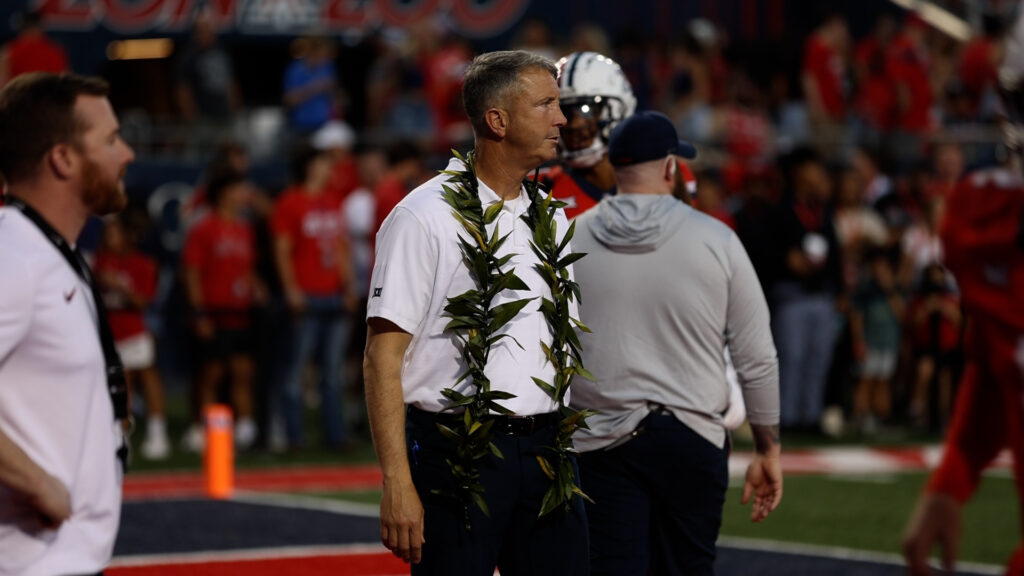Brent Brennan was all smiles and perspective at Big 12 conference meetings last spring. In the corridor of a Scottsdale hotel, the newly minted Arizona coach explained how the dynamics stood in contrast to his experience at San Jose State. Brennan wasn’t used to taking charge of a winning program, to coaching from a position of strength.
That won’t be an issue next year.
Brennan staggered through his first season in Tucson — a season of “misery” (his word) that prompted calls for his dismissal from an outraged, frustrated community that expected the Wildcats to contend for the Big 12 championship and a College Football Playoff berth.
Instead, they finished two games out of the cellar and were lapped by their arch-rival in Tempe.
Brennan will return for 2025. Athletic director Desiree Reed-Francois told the Arizona Daily Star on Sunday night that Brennan “deserves a fair chance to be successful. So, yes, he is coming back next year.”
It’s the right move for the football program and the right move for the athletic department, which is dealing with a cash squeeze akin to the trash compactor scene in Star Wars:
— The Wildcats experienced a budget shortfall in excess of $70 million over the 2023-24 fiscal years (when a $31.6 million loan from the university is removed from the budget). While changes to the business model are expected to improve the budget over time, the Wildcats are anything but flush with cash.
— Like their peers in the Big 12, the Wildcats are preparing for changes in the NCAA amateurism model that will force power conference football schools to share approximately $20 million with athletes starting next summer. (Increases in the number of scholarships across myriad sports will add millions more to the expense side over time.)
Add the cost of a coaching change — at least $15 million for the entire staff, and probably closer to $20 million — and terminating Brennan probably wasn’t considered prudent in Arizona’s Graduate School of Bean Counters.
Given the injury-ravaged roster, Brennan’s continuing employment would not have been in question had Arizona finished with a 7-5 or 6-6 record, as opposed to the reality of 4-8.
Were a handful of additional losses worth the massive budgetary stress? Not in our view.
Another reason to retain Brennan: How his dismissal would have been perceived.
Best we can tell, only two head coaches in the past 15 years have been fired after one season.
— In 2012, Southern Mississippi fired Ellis Johnson after the first-year coach took over a 12-win team and drove the Golden Eagles straight into the abyss with an 0-12 record.
— Mississippi State dismissed Zach Arnett last winter after his only full season in charge of the Bulldogs, but his situation was unique. Arnett had been named the interim coach a year earlier, following the death of Mike Leach. He won the ReliaQuest Bowl, then was given the permanent position — and lasted one season.
Put another way: No power conference school in recent memory has dismissed a head coach who was hired under normal circumstances.
Heck, Arizona gave John Mackovic three years.
Had the Wildcats become the first Power Four school to terminate its head coach after one season, the move might have impacted Reed-Francois’ candidate pool.
Granted, the paucity of coaching changes this season would have limited Arizona’s competition. But prospective candidates — and their agents — might have been wary of what they viewed as an axe-happy administration.
If Brennan doesn’t raise his game in 2025, Reed-Francois can conduct a national search with the marketplace benefits that would come from having given Brennan a fair shot.
Because for all the mistakes over his 322 days on the job, Brennan’s timing was decidedly suboptimal and fully beyond his control. He was hired Jan. 16, after the winter transfer window closed, and watched a barrage of key players depart for the portal and the NFL.
Yes, the core returned, but it was shallow. Arizona didn’t possess the depth needed to withstand the relentless number of injuries that followed.
The coaching piece was an all-systems failure, from Brennan’s staff composition to the schemes, play-calling and in-season adjustments.
For that reason, he won’t get a third chance.
He must build trust with the roster and the community, learn from his many mistakes, find some hidden gems in the transfer portal, retool his lineup of coordinators and assistants and thoroughly assess the strength-and-conditioning program.
(No staff position is more important than the strength coach.)
Brennan is no longer in the unfamiliar position of coaching from ahead.
A season in the gutter has forced him into a corner, with no choice but to do whatever it takes to change Arizona’s trajectory and save his job.
*** Send suggestions, comments and tips (confidentiality guaranteed) to wilnerhotline@bayareanewsgroup.com or call 408-920-5716
*** Follow me on the social media platform X: @WilnerHotline
Related posts:

(AP Photo/John McCoy)
Sunday Wilner Hotline – Pac-12 survival guide: Five forces that will define the path to salvation, or extinction
(AP Photo/Ralph Freso, File)
Pac-12 survival: Kliavkoff on media rights timeline, Big 12 and Big Ten threats, playoff expansion and UCLA’s move
Colorado head coach Deion Sanders (AP Photo/David Zalubowski)
Pac-12 financial projections: Move into Big 12 will lower, not eliminate campus subsidies for Four Corners schools
(AP Photo/David Zalubowski)
On media: Deion Sanders overreacts, SEC dominates ABC, the ratings game, crew news and moreJon Wilner
Jon Wilner has been covering college sports for decades and is an AP top-25 football and basketball voter as well as a Heisman Trophy voter. He was named Beat Writer of the Year in 2013 by the Football Writers Association of America for his coverage of the Pac-12, won first place for feature writing in 2016 in the Associated Press Sports Editors writing contest and is a five-time APSE honoree.
